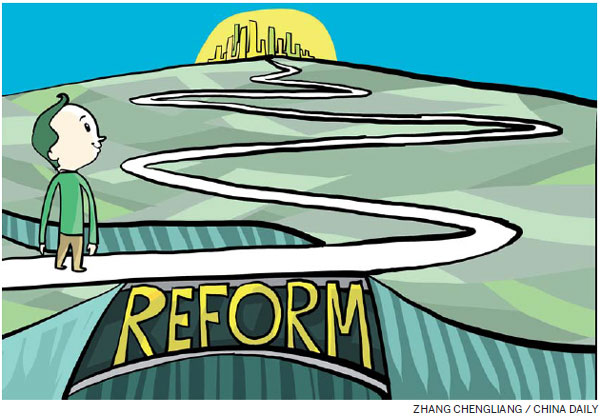Reforms to rejuvenate State-owned enterprises
Updated: 2016-07-28 07:13
(China Daily)
|
|||||||||

The State Council's latest guideline on reform of the colossal central State-owned enterprises marks a concrete step toward acceleration of the broader reform of State enterprises.
The guideline, released by China's Cabinet on Tuesday, is a quick answer to the call by President Xi Jinping early this month for SOE reform to press ahead so it can achieve substantial results as soon as possible.
It is also a continuity of the guideline on SOE reform made by the top Party and national leadership last September, which was widely seen as the top-level design for the country's management of State corporate assets.
SOE reform has been an inherent part of the country's more than 30 years of reform and opening-up. But the task has seldom been so challenging as it is today, as reform has stepped into the "deep-water zone" where it has been met with resistance from vested interests.
Admittedly, much headway has been made in SOE reform, especially central SOE reform, in recent years, with the number of SOEs sharply reduced and their managerial and supervisory mechanisms improved.
Still, the pace of reform of these economic juggernauts has been criticized for being too slow, as they are blamed for being inefficient in the use of funds despite receiving government funding and policy supports.
The latest guideline emphasizes restructuring of central SOEs and requires those with prolonged losses be forced out of the market in non-strategic sectors.
And it promises to sharpen the competitive edge of key enterprises in strategically important sectors, such as those which are an economic lifeline or essential for national security, and encourages them to explore innovative operational strategies. The State's control in such crucial sectors, which is justifiable, will be maintained, if not strengthened.
Such a differentiated strategy, if implemented smoothly, will reduce the State monopolies in some sectors; it will also adapt the country's SOEs to the latest technological revolution so that they become more globally competitive.
Such a reform philosophy has been in discussion for some years, but real progress has so far fallen short of public expectations.
Now the task facing the State-owned Assets Supervision and Administration Commission, the top regulatory body for SOEs, is to accelerate the pace of carrying out the reform agenda to "achieve substantial results as soon as possible".
Related Stories
SOE reform includes mixed ownership model 2016-07-20 08:00
South China Sea to get SOE cruises 2016-07-21 08:24
SOE reforms to speed up, target five sectors 2016-06-30 14:35
SOE subsidiaries not free from pollution control responsibilities 2016-06-27 08:36
China to roll out second SOE reform list soon 2016-06-20 14:11
SOE reform momentum to set tone for A-share market 2016-05-30 09:24
Today's Top News
No explosion, no injury report in Germany: Police
Geneva airport tightens security after French tipoff
Bill Clinton portrays Hillary as 'change-maker'
Priest, 84, killed in France, attack claimed by IS
Knife attacker in Japan kills 19 at disabled center
Michelle Obama rocks Democratic convention
Syrian suicide bomber in Germany faces deportation
Shooting at Florida nightclub kills, wounds 16
Hot Topics
Lunar probe , China growth forecasts, Emission rules get tougher, China seen through 'colored lens', International board,
Editor's Picks

|

|

|

|

|

|







